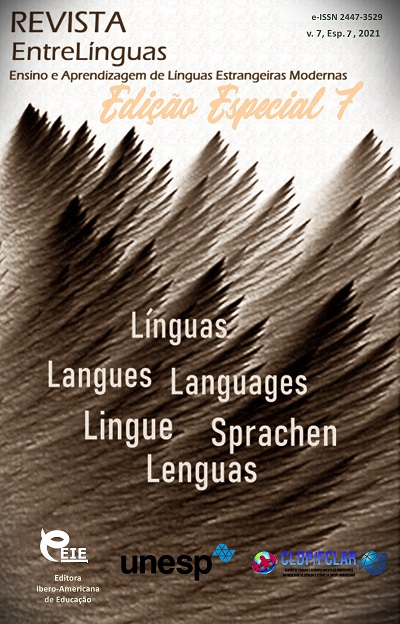Aspecto axiológico do conceito “estranha” em artigos publicísticos
DOI:
https://doi.org/10.29051/el.v7iesp.7.16296Palavras-chave:
Antropocentrismo, Conceito, Valor, Avaliação, Axiologia, Análise axiológica, Linguística axiológicaResumo
O artigo examina o status axiológico do conceito “estranho” em artigos jornalísticos dedicados ao SARS-CoV-2. A interpretação axiológica do conceito em questão ocorre por meio de vários julgamentos de valor subjetivos e objetivos. O objetivo do artigo é uma análise axiológica do conceito “estranho”, que revela significados valorativos ocultos ou explícitos, positivos, negativos ou neutros desse conceito na imagem moderna do mundo na língua inglesa. Através do estudo do componente axiológico dos conceitos, a especificidade e as preferências mentais são apresentadas não apenas de uma personalidade lingüística específica do indivíduo, mas também das pessoas como um todo em um determinado período de tempo. Através do prisma da análise axiológica de conceitos, revelam-se as peculiaridades das preferências de valor de uma personalidade linguística, que fora do contexto pode adquirir um estatuto axiológico diferente. Assim, após o estudo do conceito “estranho”, foi revelado que este conceito possui um estatuto axiológico negativo na axiosfera da imagem do mundo em língua inglesa.
Downloads
Referências
ANISIMOV, S.F. Introduction to axiology: textbook on philosophy. M.: Modern notebooks, 128 p. 2001.
ARCHIE, J. Bahm Axiology, the Science of Values: Ethics, the Science of Oughtness Rodopi, 134. 1993.
ARUTYUNOVA, N.D. About the object of the general assessment. Issues of linguistics. No. 3. 13-24. 1985.
ARUTYUNOVA, N.D. Axiology in the mechanisms of life and language. Problems of structural linguistics: collection of articles. Collection of scientific works. M., 5-23. 1984.
ARUTYUNOVA, N.D. Introduction. About the Whole on the Whole. Time and Space in the Conceptualization of Reality. Logical Analysis of Language. The Semantics of the Beginning and the End. M.: Indrik, 3-18.2002.
ARUTYUNOVA, N.D. Types of linguistic meanings: assessment, event, fact. In charge G.V. Stepanov; Academy of Sciences of the USSR, Institute of Linguistics. Moscow.: Nauka, 341 p. 1988.
Cambridge Dictionary https://dictionary.cambridge.org/ru/ (reference date: 14.12.2020)
DEMYANKOV, V.Z. Interpretation of political discourse in the media. Language of the mass media: a textbook for universities. M: Academic project, 374 - 394. 2008.
FINDLAY, J. N. Axiological Ethics. New York: Macmillan, 1970, 100. 1970.
KARASIK, V. I. Categorical signs in the word meaning: textbook. MOPI. - M., 1988.
KARASIK, V.I. Language circle: personality, concepts, discourse. Volgograd: Change, 2002. - 477 p. 2002.
KRZESZOWSKI, T.P. The Axiological Aspect of Idealized Cognitive Models. In Tomaszczyk, J. and Lewandowska, B. (eds) Meaning and Lexicography. Amsterdam: John Benjamins, 135-165. 1990.
KUBRYAKOVA, E.S., DEMYANKOV, V.Z., PANKRATS, Y.G., & LUZINA, L.G. Dictionary of Cognitive Terms in Brief.– M.: The Moscow State University Press, 245 p. 1996.
KUZINA, O.A. The axiological aspect of the linguistic representation of the image of Ukraine in the English-speaking mass media: Dis. by Ph.D. in Philology. St. Petersburg, 2019. - 161 p. 2019.
NICHOLAS RESCHER. Value Matters: Studies in Axiology, De Gruyter, 140.2004.
SEREBRENNIKOVA, E.F. Ethnosemiometry as a Way of Linguistic Axiological Analysis. Ethnosemiometry of Value Meanings: Collective Monograph.– Irkutsk: ISLU,. – S. 8 – 62.2008.
WOLF, E.M. Functional Semantics of Evaluation.– M.: Editorial of the Ukrainian SSR, – 280 p. 2002.
Downloads
Publicado
Como Citar
Edição
Seção
Licença

Este trabalho está licenciado sob uma licença Creative Commons Attribution-NonCommercial-ShareAlike 4.0 International License.
Os manuscritos aceitos e publicados são de propriedade da Revista EntreLínguas. Os artigos publicados e as referências citadas na Revista EntreLínguas são de inteira responsabilidade de seus autores.
Transferência de direitos autorais – autorização para publicação
Caso o artigo submetido seja aprovado para publicação, já fica acordado que o(s) autor(es) autoriza(m) a UNESP a reproduzi-lo e publicá-lo na EntreLínguas, entendendo-se os termos “reprodução” e “publicação” conforme definição respectivamente dos incisos VI e I do artigo 5° da Lei 9610/98. O artigo poderá ser acessado pela rede mundial de computadores (Internet), sendo permitidas, a título gratuito, a consulta e a reprodução de exemplar do artigo para uso próprio de quem a consulta, desde que haja a citação ao texto consultado. Essa autorização de publicação 328 EntreLínguas, Araraquara, v. 1, n .2, p. 323-328, jul./dez. 2015 não tem limitação de tempo, ficando a UNESP responsável pela manutenção da identificação do(s) autor(es) do artigo. Os artigos publicados e as referências citadas na Revista EntreLínguas são de inteira responsabilidade de seus autores.











